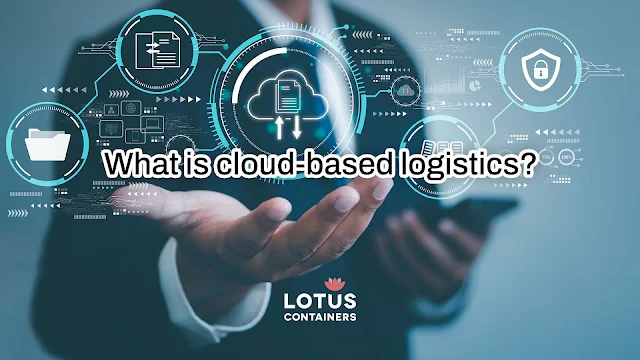What is cloud-based logistics?
Use of technology in logistics
The logistics sector is an integral part of the supply chain and shipping industry that carries out activities of containerization and transportation of goods to allow easy international trade. The various types of logistics activities include:
Procurement of goods or raw materials.
Transport it to the manufacturer, warehouse, and inventory management.
Material handling.
Documentation.
Managing suppliers.
Containerization of goods.
Transportation of goods to their destination.
All these processes have been carried out manually and with the help of machines, equipment and vehicles. However, it was time-consuming, costly, and had risks associated with human errors. Technology was introduced to streamline and optimize the logistics activities to overcome the various challenges in logistics. Cloud computing is among many technologies used in logistics to minimize manual handling and secure the process.
Define cloud-based logistics
Cloud-based logistics uses a cloud computer program hosted on various cloud infrastructures that the logistics companies utilize to manage and optimize the supply chain operations. For years, companies have stored their data in hardware, making it challenging to share and retrieve suitable information on time. Cloud-based software acts as a centralized infrastructure that helps store significant amounts of data that can be accessed by all authorized persons using the internet. Cloud-based logistics is an excellent solution that enables logistics companies to access and process stored data with more scalability, flexibility, and cost-effectiveness.
In simple words, all the data generated by the logistics activities across the supply chain are stored in the cloud for easy and real-time access to information from various logistics partners. Cloud-based logistics solutions are chosen by various logistics companies across the global supply chain as they offer an agile and responsive approach to managing the complexities of modern supply chains. Companies can collaborate better, improve their efficiency, and adapt quickly to changes in market demands and conditions.
Benefits of cloud-based logistics
The various advantages of cloud-based logistics are as follows-
Scalability- Changing business needs and market trends require organizations to scale their data management resources up or down. Cloud-based logistics is a scalable solution that offers computing resources based on the current scalability of demands to contain the waste of investments in significant infrastructure.
Cost efficient- Cloud computing uses the internet and is connected to a virtual server to offer data storage and information sharing across the globe. It eliminates the need for significant hardware, software, and maintenance investments. Businesses can take subscriptions and pay for their needed resources, resulting in cost savings.
Easy accessibility- Cloud computing depends on internet servers and can be accessed by authorized trade partners from anywhere globally. All information can be accessed, and cloud-based logistics can retrieve data remotely.
Real-time sharing- Cloud-based logistics infrastructures facilitate agility in the supply chain by offering greater transparency and visibility of shipping activities. Stakeholders can track their shipments, inventory levels, and order status using the real-time information stored in the cloud. It allows businesses to make data-driven decisions proactively and improves operational efficiency.
Faster communication- Cloud-based solutions allow global supply chain stakeholders to collaborate with suppliers, manufacturers, distributors, and logistics service providers to access and share real-time information. It facilitates communication and coordination among multiple stakeholders.
Applications of cloud-based logistics
The use of cloud-based logistics in various logistics activities are-
Managing warehouses- Cloud-based warehouse management systems (WMS) applications help businesses streamline, supervise, and optimise warehouse operations, such as inventory management and order fulfilment. Cloud-based logistics allows real-time visibility into warehouse activities that help enhance operational efficiency and risk mitigation.
Systematic transportation- Cloud-based transport management system (TMS) solutions help optimise navigational routes and plan and execute faster transportation of goods across the supply chain.
Inventory management- Cloud-based logistics also power inventory management systems that allow businesses to track stock levels in real-time. This way, organizations can optimize their inventories and prevent stockouts and surplus goods, thereby reducing holding costs.
Supply chain visibility- Since all the data is stored in the cloud, stakeholders can access real-time information to track the movement of their goods. This end-to-end visibility in the supply chain helps reduce cargo theft, loss or damage during transit.
Collaborative planning- Goods move from exporters to importers to distributors or other shipping parties. Cloud-based logistics applications help shareholders collaborate and plan to optimise the supply chain.
These are a few benefits and applications of cloud-based logistics that are used by businesses to streamline and optimise logistics activities.
Managing warehouses- Cloud-based warehouse management systems (WMS) applications help businesses streamline, supervise, and optimise warehouse operations, such as inventory management and order fulfilment. Cloud-based logistics allows real-time visibility into warehouse activities that help enhance operational efficiency and risk mitigation.
Systematic transportation- Cloud-based transport management system (TMS) solutions help optimise navigational routes and plan and execute faster transportation of goods across the supply chain.
Inventory management- Cloud-based logistics also power inventory management systems that allow businesses to track stock levels in real-time. This way, organizations can optimize their inventories and prevent stockouts and surplus goods, thereby reducing holding costs.
Supply chain visibility- Since all the data is stored in the cloud, stakeholders can access real-time information to track the movement of their goods. This end-to-end visibility in the supply chain helps reduce cargo theft, loss or damage during transit.
Collaborative planning- Goods move from exporters to importers to distributors or other shipping parties. Cloud-based logistics applications help shareholders collaborate and plan to optimise the supply chain.
LOTUS Containers offers shipping container services to their clients by selling and leasing new and old shipping containers across the globe.



Comments